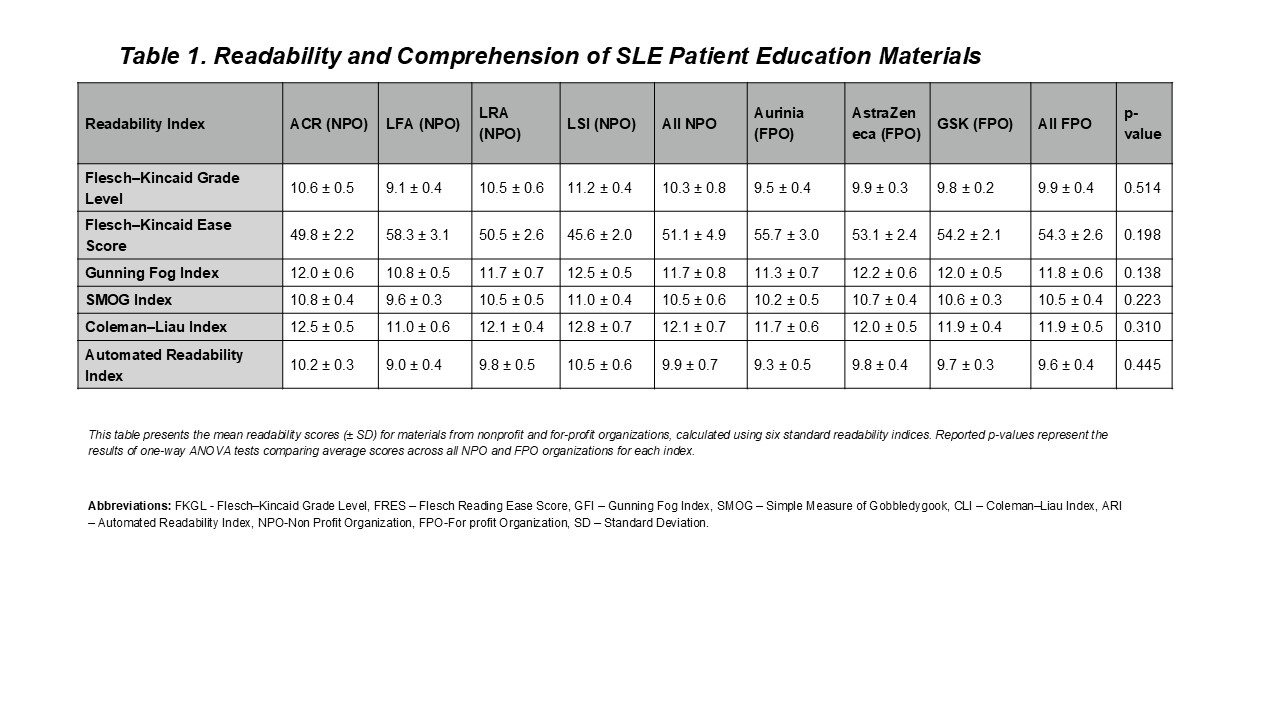Session Information
Date: Tuesday, October 28, 2025
Title: (2377–2436) Systemic Lupus Erythematosus – Diagnosis, Manifestations, & Outcomes Poster III
Session Type: Poster Session C
Session Time: 10:30AM-12:30PM
Background/Purpose: Systemic Lupus Erythematosus (SLE) is a chronic multisystemic autoimmune disease that had multidimensional adverse effects on patients lives, and preferentially inflicts young women, specially of color. Patient education materials (PEMs) help patients understand their condition and manage it better. However, these materials frequently exceed the reading ability of the general population, posing challenges for individuals with limited health literacy. The National Institutes of Health (NIH) and the American Medical Association (AMA) recommend that PEMs be written at or below a 6th-grade reading level. We aimed to evaluate the readability and comprehension of SLE-related PEMs available online from both nonprofit and for-profit organizations.
Methods: We analyzed the SLE PEMs from four nonprofit organizations (American College of Rheumatology-ACR, Lupus Foundation of America-LFA, Lupus Research Alliance-LRA, and Lupus Society of Illinois-LSI) and three for-profit companies (Aurinia, AstraZeneca, and GlaxoSmithKline). Readability and comprehension scores were calculated using six standard tools, and group-level comparisons were performed using one-way ANOVA followed by Tukey’s post-hoc analysis. A p-value of ≤0.05 was considered significant.
Results: The average Flesch–Kincaid Grade Level and Flesch Reading Ease scores across all patient education materials (PEMs) were 10.05 ± 0.7 and 52.68 ± 4.1, respectively. On average, materials from nonprofit organizations had a Flesch–Kincaid Grade Level of 10.3 ± 0.8 and a Reading Ease score of 51.1 ± 4.9, whereas for-profit organizations had a slightly lower Grade Level of 9.9 ± 0.4 and a higher Ease score of 54.3 ± 2.6. These differences were not statistically significant (p = 0.51 and 0.20respectively). However significant within-group differences were observed. Among nonprofit organizations, PEMs from the Lupus Foundation of America (LFA) had the best reading and comprehension metrics: (Flesch–Kincaid Grade Level of 9.1 ± 0.4 and a Reading Ease score of 58.3 ± 3.1), as compared to ACR (10.6 ± 0.5, 49.8 ± 2.2), LRA (10.5 ± 0.6, 50.5 ± 2.6), and LSI (11.2 ± 0.4, 45.6 ± 2.0) (p < 0.01). Among for-profit organizations, reading and comprehension levels for PEMs from Aurinia were significantly better in reading and comprehension (Flesch Kincaid Grade level 9.5 ± 0.4 and Reading Ease score of 55.7 ± 3.0), than AstraZeneca (9.9 ± 0.3, 53.1 ± 2.4) and GSK (9.8 ± 0.2, 54.2 ± 2.1) (both p < 0.001).
Conclusion: Most SLE patient education materials online (from both nonprofit and for-profit organizations) are written at or above 10th grade level. These findings highlight the urgent need to improve the reading and comprehension of patient education resources to better assist individuals in understanding and managing their health.
To cite this abstract in AMA style:
Shaik N, Nweke U, Jolly M. Evaluating the Readability and Comprehension of Patient Education Materials for Systemic Lupus Erythematosus (SLE) Available Online [abstract]. Arthritis Rheumatol. 2025; 77 (suppl 9). https://acrabstracts.org/abstract/evaluating-the-readability-and-comprehension-of-patient-education-materials-for-systemic-lupus-erythematosus-sle-available-online/. Accessed .« Back to ACR Convergence 2025
ACR Meeting Abstracts - https://acrabstracts.org/abstract/evaluating-the-readability-and-comprehension-of-patient-education-materials-for-systemic-lupus-erythematosus-sle-available-online/

